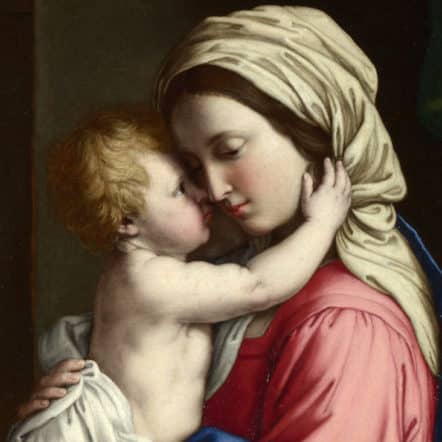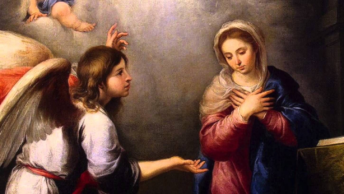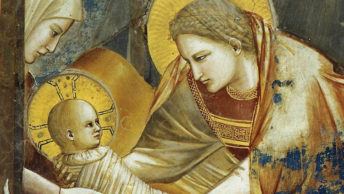Once there was an absent-minded college professor who was so absorbed in his field of teaching and research that he had trouble remembering even the simplest events and details of daily life. As he was leaving for work one morning, his wife said, “Now Henry, remember, we are moving today to our new house on the other side of town, so don’t come back here this afternoon.” “Yes, dear,” he said distractedly as he went out the door. However, that afternoon the professor returned to the original house, just as he always did, and was confused to find the house empty, all the furniture gone, and no one there. As he stepped outside in a daze, he saw a young boy on the sidewalk, and asked, “Little boy, do you know the people who used to live here?” The lad answered, “Sure, Dad; Mom told me you’d forget” (Donald Deffner, Seasonal Illustrations, p. 6).
Memory can be a tricky thing. Back on November 15, the feast of St. Albert the Great, I had Mass at an area nursing home, and in the homily I told the residents I appreciated this saint because, despite his brilliant mind, he began forgetting many things later in life—a very common experience as we grow older. To this, all the residents nodded in agreement. Some of the saints had excellent memories, but others were very much challenged in this area. A foremost example was a 5th century monk known to us today as St. John the Dwarf; he was so absent-minded he frequently lost track of what he was doing. On one occasion someone came to borrow some tools. John went to get them—but he forgot what he was about, and had to return to the door to ask the visitor for a reminder. This might not strike us as all that unusual—except for the fact that St. John had to go through this process three times before completing the errand successfully.
Our memories are almost certainly not that bad, but we do face challenges; when it comes to living in a very busy, intense, and often crazy or deluded society, it’s often hard to remember what life is really about. The Church gives us this Advent season as a chance to pause and reflect on what truly matters, and to prepare ourselves to celebrate the greatest gift of all. As the coming of our Savior proves, God never forgets His people—but we must choose to respond to Him with love, gratitude, and faith.
In Old Testament times, there was an established religious hierarchy, with a temple priesthood, including the high priest, and scribes, Pharisees, rabbis, and other religious scholars and teachers. When they were faithfully worshipping God and fulfilling their duties, all was well with the nation of Israel; it’s when they forgot about the Lord through sinfulness, laziness, and corruption that He was forced to intervene by raising up prophets to call the leaders and the people back to repentance and renewal. This was the mission of St. John the Baptist; he was reminding the people of their duties toward God and preaching a baptism of repentance. Many of the Pharisees and Sadducees had forgotten the importance of obeying God in a spirit of genuine love and humility—so John, as a voice crying out in the desert, warned them of the reality of divine judgment. The prophet Isaiah foretells the coming Messiah, who will judge the poor with justice while establishing a glorious kingdom of peace and prosperity, and in the Letter to the Romans St. Paul reminds his readers that all who believe in Jesus will be welcome in Heaven—but this requires us to stay focused on our own mission in life, rather than letting ourselves be distracted by this world’s allurements, temptations, and false values.
Scientists claim the human mind can easily store up to 600 memories a second in a lifetime of 75 years—for an incredible total of over 1.4 trillion memories! (Roy B. Zuck, The Speaker’s Quote Book, p. 248). Even if that’s true, however, so many people in our world seem to have forgotten why we’re here. Life isn’t ultimately about making money, obtaining influence and power, or achieving popularity and success; it’s about becoming the persons God wants us to be, fulfilling the mission He has given us, and following Jesus into eternal life. When we forget this, we veer off the proper path and can get bogged down in passing, unimportant things—and if we don’t come to our senses and repent, we’ll let ourselves be led astray and wind up personally unhappy and unfulfilled, and utterly miserable for all eternity.
Advent is a time for remembering: remembering that Jesus came to save us, remembering that He comes to us here at Mass in His Word and Sacrament, and remembering that He will come again at the end of time to judge the living and the dead—including each one of us. The world tries to make us forget these truths by creating a false sense of urgency when it comes to Christmas shopping and activities, shouting at us about luxury and consumption and keeping busy, and fostering a sense of competition and comparison and guilt when we fail to conform—all the while hoping to make us forget what really matters. Jesus speaks a very different message to us, a message of love and truth and peace—but we must make a deliberate effort to hear and listen to Him. This certainly involves attending Mass each week and praying every day, even if just for a few minutes, while also being alert to the needs and feelings of those around us; it may very well also involve turning off the TV, unplugging the phone, and reading Scripture or a booklet of Advent reflections for a short while, and making an extra effort to be present to family and loved ones. Experiences of grace can happen at unexpected moments, giving us reminders of God’s loving presence; however, it’s up to us to have enough silence and space in our lives to recognize them when they come.
Christmas is proof that the Lord never forgets or forsakes us; Advent should be a time to remind ourselves of this truth, reflect on what it means for us personally, and prepare ourselves to celebrate God’s love in a spirit of gratitude and trust. It doesn’t really matter how many things we forget over the course of our lives, as long as we remember this: Jesus offers each of us a personal relationship with Him in the midst of His Church, and as long as we listen and respond in faith, we will discover a joy and a peace that lasts forever.








